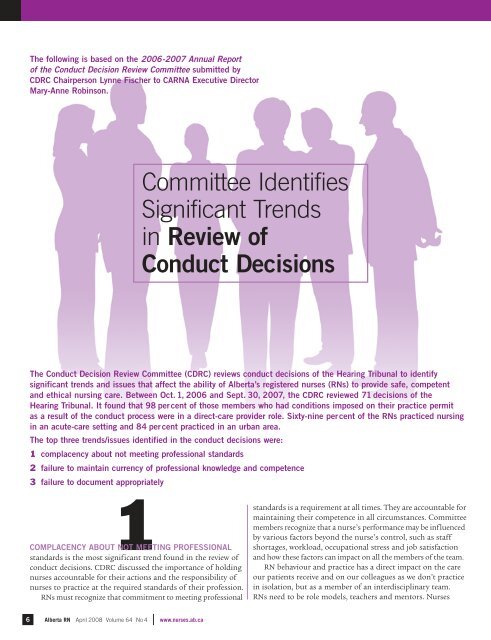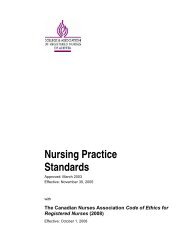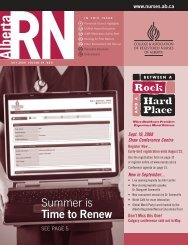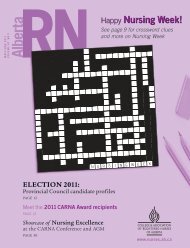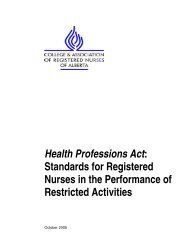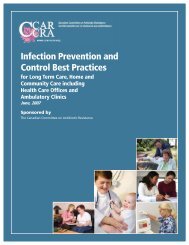I am a nurse. - College & Association of Registered Nurses of Alberta
I am a nurse. - College & Association of Registered Nurses of Alberta
I am a nurse. - College & Association of Registered Nurses of Alberta
Create successful ePaper yourself
Turn your PDF publications into a flip-book with our unique Google optimized e-Paper software.
The following is based on the 2006-2007 Annual Report<br />
<strong>of</strong> the Conduct Decision Review Committee submitted by<br />
CDRC Chairperson Lynne Fischer to CARNA Executive Director<br />
Mary-Anne Robinson.<br />
The Conduct Decision Review Committee (CDRC) reviews conduct decisions <strong>of</strong> the Hearing Tribunal to identify<br />
significant trends and issues that affect the ability <strong>of</strong> <strong>Alberta</strong>’s registered <strong>nurse</strong>s (RNs) to provide safe, competent<br />
and ethical nursing care. Between Oct. 1, 2006 and Sept. 30, 2007, the CDRC reviewed 71 decisions <strong>of</strong> the<br />
Hearing Tribunal. It found that 98 per cent <strong>of</strong> those members who had conditions imposed on their practice permit<br />
as a result <strong>of</strong> the conduct process were in a direct-care provider role. Sixty-nine per cent <strong>of</strong> the RNs practiced nursing<br />
in an acute-care setting and 84 per cent practiced in an urban area.<br />
The top three trends/issues identified in the conduct decisions were:<br />
1 complacency about not meeting pr<strong>of</strong>essional standards<br />
2 failure to maintain currency <strong>of</strong> pr<strong>of</strong>essional knowledge and competence<br />
6<br />
3 failure to document appropriately<br />
1<br />
COMPLACENCY ABOUT NOT MEETING PROFESSIONAL<br />
standards is the most significant trend found in the review <strong>of</strong><br />
conduct decisions. CDRC discussed the importance <strong>of</strong> holding<br />
<strong>nurse</strong>s accountable for their actions and the responsibility <strong>of</strong><br />
<strong>nurse</strong>s to practice at the required standards <strong>of</strong> their pr<strong>of</strong>ession.<br />
RNs must recognize that commitment to meeting pr<strong>of</strong>essional<br />
<strong>Alberta</strong> RN April 2008 Volume 64 No 4 www.<strong>nurse</strong>s.ab.ca<br />
Committee Identifies<br />
Significant Trends<br />
in Review <strong>of</strong><br />
Conduct Decisions<br />
standards is a requirement at all times. They are accountable for<br />
maintaining their competence in all circumstances. Committee<br />
members recognize that a <strong>nurse</strong>’s performance may be influenced<br />
by various factors beyond the <strong>nurse</strong>’s control, such as staff<br />
shortages, workload, occupational stress and job satisfaction<br />
and how these factors can impact on all the members <strong>of</strong> the te<strong>am</strong>.<br />
RN behaviour and practice has a direct impact on the care<br />
our patients receive and on our colleagues as we don’t practice<br />
in isolation, but as a member <strong>of</strong> an interdisciplinary te<strong>am</strong>.<br />
RNs need to be role models, teachers and mentors. <strong>Nurses</strong>


